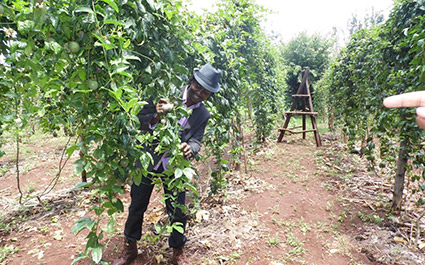George Kuria, an International Business Administration graduate from the United States International University, quit a high-income job at Kenya Commercial Bank (KCB) in 2013 after working for less than a year to venture into agribusiness.
Nothing has come easy though or as he expected, but as Kuria recounts, you will see the point in his optimism that “money is in the soil”.
His two-acre farm curved out of his family’s 12 acres has three main fruits – pawpaws, tree tomatoes and passion fruits. Passion fruit occupies the biggest portion, earning him the highest income and is harvested regularly besides having the longest profitable life.
TerryAnne Chebet: 10 businesses you can start with Sh. 10,000
Kuria, who graduated in 2012, is now into his third-year of farming in the area with cool weather and well-drained red soils. He first got a clerical job in Nairobi but his zeal for self-employment saw him run an eatery, which he later found to be too demanding.
As he joined KCB as a teller, he still ran the eatery at Wangige in Kabete. “But I had to close it down after only four months due to cash flow problems.”
As he closed it, he had picked one lesson – demand for rabbit meat was going up but only a few hotels could cook it nicely.
“This is the idea I brought home and I started by buying a buck and a doe of superior breed at Sh. 5,000.”
The animals increased to 10 but a disease hit them and they all died one by one. Kuria, who was by then broke, was on the verge of losing hope but his grandmother Hannah Chiemba, his pillar, gave him two acres and bought him three more rabbits urging him to continue with the business.
“I had by then learnt a lot about fruits during my regular visits to the local farms and the Kenya Agricultural and Livestock Research Organisation (Kalro) in Embu.”
Kuria started his crop farming venture with capsicum and watermelons, but he later switched to fruits. He planted 100 tree tomatoes, 100 pawpaws and 100 passion plants, which he bought the seedlings from the research institution at an average price of Sh. 30 each.
In two months, the grafted passion fruits started to bring him a harvest of Sh500 daily. He increased the plants to 300 and now the fruit occupies the biggest portion of the two acres.
He sells four passion fruits for Sh. 20, with total sales reaching Sh. 3,000 on good in-season days. In a good season his income can go up to Sh. 4,000 daily in-season.
Kuria is now a well-known farmer and the sole passion fruit grower in Mukinduri ward inhabited by over 20,000 residents. Living in an area where residents shun fruit farming, his is the largest passion fruit farm in the area, supplying daily to about 20 retail traders based at the main Kerugoya open air market.
Kuria also supplies over 500kg of pawpaws every two months at Sh. 250 per kilo and tree tomatoes worth Sh. 15,000 each of the three harvests in a year.
All the three fruits are long-term crops and require “intensive work of regular pruning, monitoring and spraying while passion in particular requires large capital of posts and wires and labour, which puts off many farmers,” he says.
Passion fruits, which remains productive for up to six years are “heavy feeders”, according to Kuria, which means one must always have animal and compost manure.
To get quality manure, an animal needs to be fed with good pasture and the manure must also be stored and handled properly to reduce loss of nutrients.
This is a tall order for many farmers used to traditional methods especially in areas where the old control land use, says Alex Njenga, a Ministry of Agriculture agronomist in Kiambu.
“But the old farmer is aging and losing interest and capacity to adopt these new methods of soil management. This is what is hindering good farming in the larger central region.”
Most of young farmers are too impatient to grow long-term crops like passion fruits, says Njenga. Thus, they prefer vegetables like sukuma wiki (collard greens) and other short-term crops for quick money.
“I decided to go for long-term crops because they are well-paying. While you wait for long, the returns are better. I have learnt that there is no short-cut in farming and you cannot farm from the office,” says Kuria, adding that even if he stayed in the bank, he would not be earning what he is getting now.
The young farmer has diversified into chicken farming. He keeps over 60 free–range kienyeji chickens and sells at least three in a month at Sh. 1,500 each for the cocks and Sh. 800 for hens.









